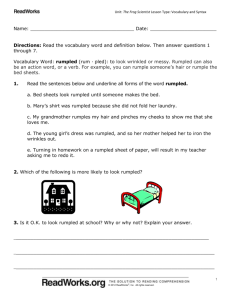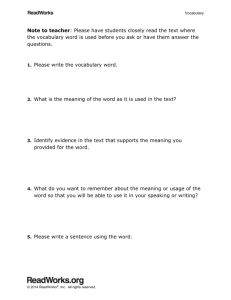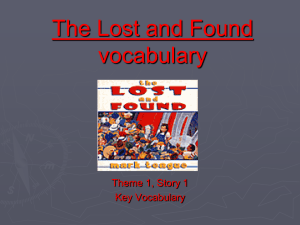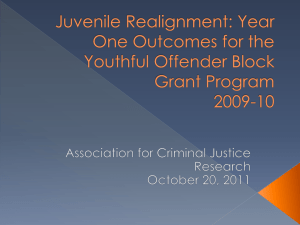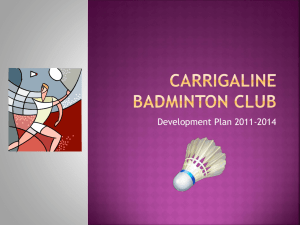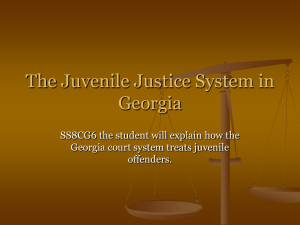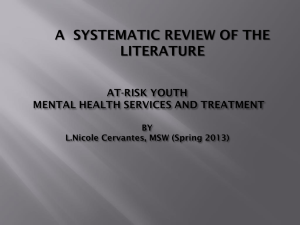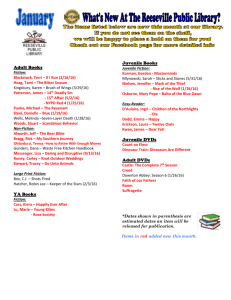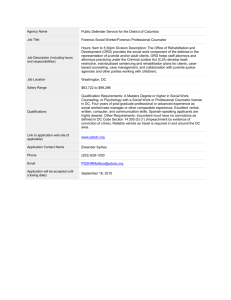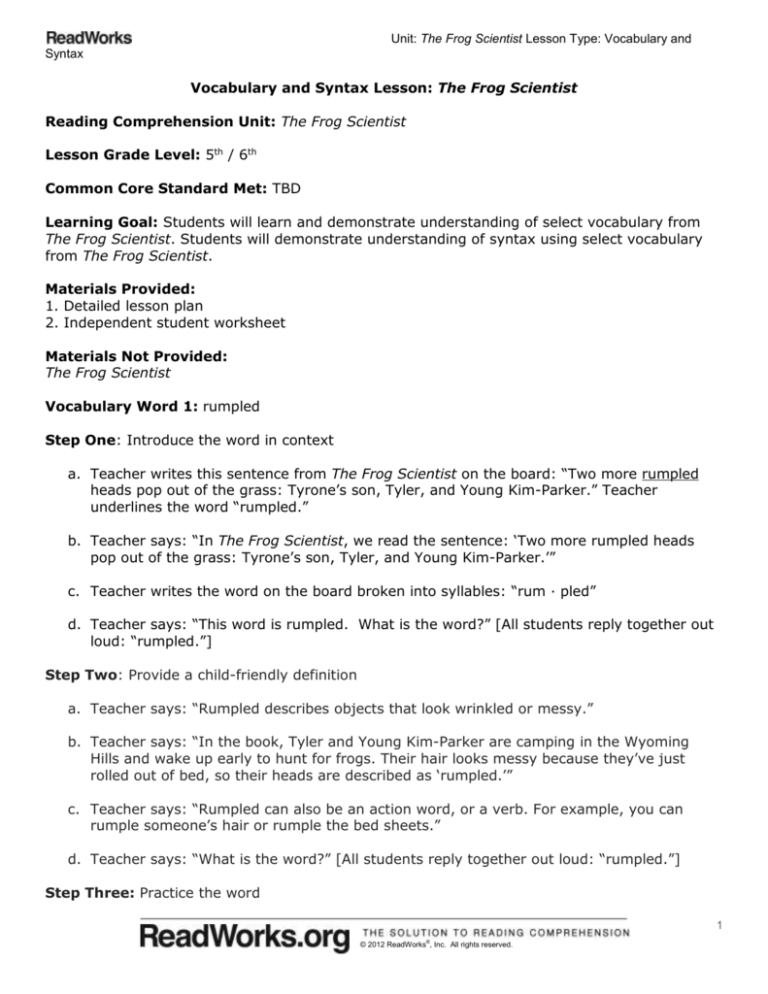
Unit: The Frog Scientist Lesson Type: Vocabulary and
Syntax
Vocabulary and Syntax Lesson: The Frog Scientist
Reading Comprehension Unit: The Frog Scientist
Lesson Grade Level: 5th / 6th
Common Core Standard Met: TBD
Learning Goal: Students will learn and demonstrate understanding of select vocabulary from
The Frog Scientist. Students will demonstrate understanding of syntax using select vocabulary
from The Frog Scientist.
Materials Provided:
1. Detailed lesson plan
2. Independent student worksheet
Materials Not Provided:
The Frog Scientist
Vocabulary Word 1: rumpled
Step One: Introduce the word in context
a. Teacher writes this sentence from The Frog Scientist on the board: “Two more rumpled
heads pop out of the grass: Tyrone’s son, Tyler, and Young Kim-Parker.” Teacher
underlines the word “rumpled.”
b. Teacher says: “In The Frog Scientist, we read the sentence: ‘Two more rumpled heads
pop out of the grass: Tyrone’s son, Tyler, and Young Kim-Parker.’”
c. Teacher writes the word on the board broken into syllables: “rum · pled”
d. Teacher says: “This word is rumpled. What is the word?” [All students reply together out
loud: “rumpled.”]
Step Two: Provide a child-friendly definition
a. Teacher says: “Rumpled describes objects that look wrinkled or messy.”
b. Teacher says: “In the book, Tyler and Young Kim-Parker are camping in the Wyoming
Hills and wake up early to hunt for frogs. Their hair looks messy because they’ve just
rolled out of bed, so their heads are described as ‘rumpled.’”
c. Teacher says: “Rumpled can also be an action word, or a verb. For example, you can
rumple someone’s hair or rumple the bed sheets.”
d. Teacher says: “What is the word?” [All students reply together out loud: “rumpled.”]
Step Three: Practice the word
1
© 2012 ReadWorks®, Inc. All rights reserved.
Unit: The Frog Scientist Lesson Type: Vocabulary and
Syntax
Teacher provides examples and additional opportunities to repeat the word. Read the first
sentence out loud to your students. Begin reading it again and when you come to the vocabulary
word prompt students to say the vocabulary word out loud. Then, finish reading the sentence
out loud to your students.
1.
a. Bed sheets look rumpled until someone makes the bed.
b. Mary’s shirt was rumpled because she did not fold her laundry.
c. My grandmother rumples my hair and pinches my cheeks to show me that she loves
me.
d. The young girl’s dress was rumpled, and so her mother helped her to iron the wrinkles
out.
e. Turning in homework on a rumpled sheet of paper, will result in my teacher asking me
to redo it.
Step Four: Check for student understanding
This step can be completed as a whole class activity or as an independent practice.
2. Which of the following is more likely to look rumpled?
3. Is it O.K. to look rumpled at school? Why or why not? Explain your answer.
Suggested answer: Answers may vary.
4. Rearrange the words into a complete sentence with correct punctuation and capitalization:
my hair I wake up rumpled looks when in the morning
Suggested answer: My hair looks rumpled when I wake up in the morning. OR When I wake
up in the morning, my hair looks rumpled.
2
© 2012 ReadWorks®, Inc. All rights reserved.
Unit: The Frog Scientist Lesson Type: Vocabulary and
Syntax
5. Complete the given sentences using because, even though, and as a result.
My gym clothes get rumpled…
Suggested answers:
My gym clothes get rumpled because I stuff them in my gym bag.
My gym clothes get rumpled even though I try to fold them neatly.
My gym clothes get rumpled as a result of storing them in my locker.
Note to Teacher: You may want to introduce the following question type with an example.
6. EXAMPLE: Combine the sentences A and B below into one sentence using the word
because.
A. The sun is hot.
B. I went to the pool.
Answer: I went to the pool because the sun is hot.
Combine the sentences C and D below into one sentence using the word so.
C. I didn’t fold my laundry.
D. My shirts are rumpled.
Suggested answer: I didn’t fold my laundry, so my shirts are rumpled.
7. Answer the following questions based on the sentence below.
At the end of the summer, the tent was all rumpled because it had been stuffed into the damp
car trunk for months.
Who? the tent
(was) What? rumpled
Why? because it had been stuffed into the damp car trunk for months
Vocabulary Word 2: juvenile
Step One: Introduce the word in context
3
© 2012 ReadWorks®, Inc. All rights reserved.
Unit: The Frog Scientist Lesson Type: Vocabulary and
Syntax
a. Teacher writes this sentence from The Frog Scientist on the board: “Though they try to be
sneaky, with each step juvenile leopard frogs scatter in all directions.” Teacher underlines
the word “juvenile.”
b. Teacher says: “In The Frog Scientist, we read the sentence: ‘Though they try to be
sneaky, with each step juvenile leopard frogs scatter in all directions.’”
c. Teacher writes the word on the board broken into syllables: “ju · ve · nile”
d. Teacher says: “This word is juvenile. What is the word?” [All students reply together out
loud: “juvenile.”]
Step Two: Provide a child-friendly definition
a. Teacher says: “Juvenile means young, not grown up, or meant for young people.”
b. Teacher says: “Dr. Tyrone and his team are hunting for young leopard frogs, or juvenile
leopard frogs. In that context, juvenile means young.”
c. Teacher says: “What is the word?” [All students reply together out loud: “juvenile.”]
Step Three: Practice the word
Teacher provides examples and additional opportunities to repeat the word. Read the first
sentence out loud to your students. Begin reading it again and when you come to the vocabulary
word prompt students to say the vocabulary word out loud. Then, finish reading the sentence
out loud to your students.
8.
a. PG-rated movies are approved for juvenile audiences.
b. Young people who commit crimes are called juvenile offenders.
c. A 12-year-old may be juvenile, but she can still make her own decisions.
d. Bullying another student is a juvenile act that usually results in being thrown out of
school.
e. Mary is a juvenile, so she needs an adult to travel with her on airplanes.
Step Four: Check for student understanding
This step can be completed as a whole class activity or as an independent practice.
9. Which of the following books is most likely meant for juveniles?
4
© 2012 ReadWorks®, Inc. All rights reserved.
Unit: The Frog Scientist Lesson Type: Vocabulary and
Syntax
10. Is Sesame Street a juvenile TV show? Why or why not?
Suggested answer: Yes, Sesame Street is a juvenile TV show because it is meant for young
kids.
11. Rearrange the words into a complete sentence with correct punctuation and capitalization:
readers juvenile children’s are written for books
Suggested answer: Children’s books are written for juvenile readers.
12. Complete the given sentences using because, although, and especially.
Juvenile books often have pictures…
Suggested answers:
Juvenile books often have pictures because they help readers understand the story.
Juvenile books often have pictures although advanced readers don’t need them.
Juvenile books often have pictures, especially when they’re written for little kids.
13. Combine sentences A and B below into one sentence using the word although.
A. Mary is an excellent soccer player.
B. She is only able to compete in the juvenile soccer league.
Suggested answer: Although Mary is an excellent soccer player, she is only able to compete in
the juvenile soccer league.
14. Answer the following questions based on the sentence below.
Many juvenile fans attended the concert at Madison Square Garden because Justin Bieber was
the main act.
5
© 2012 ReadWorks®, Inc. All rights reserved.
Unit: The Frog Scientist Lesson Type: Vocabulary and
Syntax
What? juvenile fans
(did) What? attended the concert
Where? Madison Square Garden
Why? because Justin Bieber was the main act
Extension – Vocabulary Word 3: pesticide
a. Teacher says: “In the book, we learned that pesticides are chemicals designed to kill a
‘pest’—either a weed or an insect.”
b. Teacher says: “You might have noticed that ‘pesticide’ is similar to other words that also
have to do with killing, words like homicide, suicide, and genocide.” [Teacher writes those
words on the board.]
c. Teacher says: “All of those words—pesticide, homicide, suicide, and genocide—have the
same ending: ~cide. Let’s underline that ending for each word.” [Teacher underlines
‘~cide’ in each word.]
d. Teacher says: “~cide is a root ending that means ‘to kill’. When we see a word that ends
in ~cide, we know that the definition has to do with killing.”
e. Teacher says: “For each word, we look at the first half of the word to see what is being
killed. For example, we know that pesticides kill pests because the first half of the word is
‘pest’ and the second half is ‘cide.’ Or, we know that homicide means killing people
because the first half is similar to homo, which means person, and the second half is
‘cide.’”
f. Teacher says: “What do we know when we see a word that ends in ~cide?” [All students
reply together out loud: “The definition has do with killing.”]
Suggested Additional Vocabulary: feminized, exposed, predators, squelching, hibernate
6
© 2012 ReadWorks®, Inc. All rights reserved.

